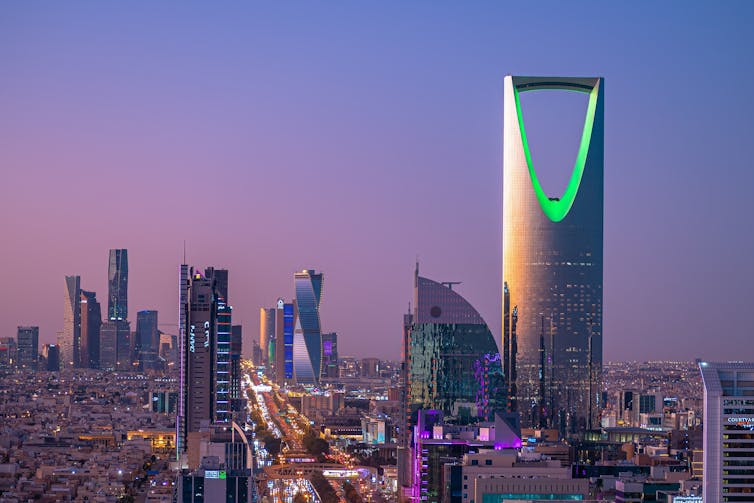After signing a US$142 billion (£107 billion) arms deal with Saudi Arabia, Donald Trump said the US bond with that country was “more powerful than ever”. He was also reportedly quite pleased with the gift of a private jet from Qatar.
But these arrangements are just the latest developments in a long history of the Gulf monarchies supporting the architecture of American global power. And while the six Gulf states (Saudi Arabia, United Arab Emirates, Kuwait, Qatar, Bahrain and Oman) have recently started redirecting their energy and trade ties eastward, especially towards China, they remain deeply embedded in the US-led financial order.
As I explore in my recent book, Crude Capitalism, the Gulf states were instrumental in the rise of American global economic dominance.
With oil emerging as the dominant fossil fuel through the second half of the 20th century, the Gulf’s nationalised petroleum industries generated vast amounts of income. Much of this was invested back into the US financial markets, particularly treasury bonds (essentially a long-term loan to the US government). This gave the US access to cheap foreign capital and reinforced the global dominance of the dollar.
Put simply, the Gulf states were not peripheral to the US’s growing financial power – they were an essential contributor.

Get your news from actual experts, straight to your inbox. Sign up to our daily newsletter to receive all The Conversation UK’s latest coverage of news and research, from politics and business to the arts and sciences.
This arrangement also involved a political bargain: US military protection for the Gulf monarchies in exchange for investment flows and energy stability. The result was a web of US military bases across the region and a deep alignment between authoritarian Gulf regimes and western strategic interests.
But much has changed in the past two decades. China’s rise as a global manufacturing hub has driven a huge increase in oil consumption, shifting the direction of the Gulf’s oil exports away from the US and western Europe towards China and east Asia.
These energy ties have been accompanied by much deeper trade interdependence and a huge increase in Chinese investments in the Gulf. In 2005, China was responsible for just 9% of the Gulf’s imports. Today, that figure is over 20%, while the US and EU’s share has fallen from 45% to 16%. China has also recently overtaken the US as the largest foreign investor in Saudi Arabia.
From Beijing’s perspective, the Gulf is a critical energy lifeline. From the Gulf’s side, China’s continuing demand for oil, gas and petrochemicals is a vital part of its economic future.
For the moment, that economic situation looks pretty robust. In 2024, Gulf countries held around US$800 billion in foreign reserves (foreign currencies and other assets), which is more than India or Switzerland. Their sovereign wealth funds (a state owned investment fund) manage another US$4.9 trillion of assets.
Private wealth, including that held by ruling families, stood at US$2.8 trillion in 2022, and is expected to reach US$3.5 trillion by 2027.
Much of this money is invested domestically, in sectors including infrastructure, real estate and renewable energy. But an astonishing amount flows directly into US markets.
Oil be back
According to US Treasury data, total Gulf holdings of American securities (bonds, stocks and corporate debt) rose from US$611 billion in 2017 to over US$1 trillion in 2024. Outside of Canada and financial hubs like London and Ireland, the Gulf is now the largest foreign investor in the US stock market.
Another route through which Gulf wealth flows back into the US is via military procurement. According to the Stockholm International Peace Research Institute, the Gulf states accounted for 22% of all global arms imports between 2019 and 2023 – more than any other region in the world.

Kashif Hameed/Shutterstock
The US supplies the overwhelming majority of these weapons. In this way, Gulf spending supports the American military industry, and in return, these states become more closely tied to the US military’s umbrella.
These deep military, financial and strategic ties help explain the real focus of Trump’s visit to the Gulf. Much of the discussion will have centred on massive investment pledges made by Gulf states to the US – including Saudi Arabia’s promise to invest up to US$600 billion, and the UAE’s commitment to a US$1.4 trillion investment over ten years.
And such pledges reflect a broader agenda which involves expanding deals in artificial intelligence, critical minerals, energy infrastructure and advanced manufacturing.
So Trump travelling to the region is not just about private jets and spectacle. It is about the continuing relevance of a structural relationship essential to American power, and a deepening financial integration between the Gulf and the US.
For even as the Gulf reorients its energy flows eastward, it remains deeply tied to US finance, the US military industry and US assets. In an era of weakening US global power – and the possible spectre of a deeper clash with China – this is what will define Trump’s visit.




